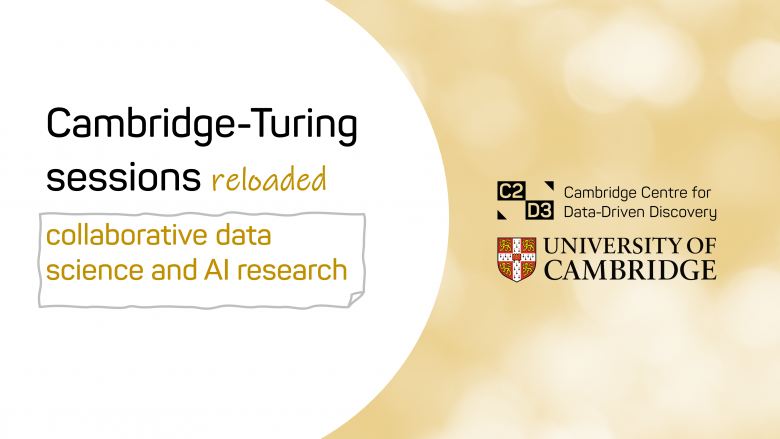Posted 29 October 2021
Cambridge-Turing sessions reloaded follows on from our summer event. This series of online sessions reflected the strengths and collaborations of data science and AI research across the University and many of the presentations showcased the University’s partnership with The Alan Turing Institute. Our speakers covered a wide range of themes and disciplines including predicting personalities, mental health, personalised healthcare, and data science for science and humanities.
Watch on demand
C2D3 member can access the on demand recording via the Member Resources page here.
Speakers
Prof. Zoe Kourtzi Head of the Adaptive Brain Lab; Turing Fellow; Fellow of Downing
- Title: AI-guided solutions for early detection of dementia
Dr Paul Schofield Reader in Biomedical Informatics; Department of Physiology, Development and Neuroscience
- Title: The cooked and the raw; extracting and exploiting structured and unstructured clinical data from patient electronic health records
Dr Ronita Bardhan Assistant Professor of Sustainability in the Built Environment; Director, MPhil in Architecture and Urban Studies;Fellow of Architecture at Selwyn College.
- Title: Data driven built environment design for decoupling energy and health burdens in poverty
Dr Sebastian Ahnert Department of Chemical Engineering and Biotechnology at Cambridge, and also seconded to the Turing as Senior Research Fellow in the Data Science for Science programme
- Title: Modelling the Impact of Climate Change on UK Agriculture
Abstracts
Prof. Zoe Kourtzi
Head of the Adaptive Brain Lab; Turing Fellow; Fellow of Downing.
Title: AI-guided solutions for early detection of dementia
Alzheimer’s disease (AD) is characterised by a dynamic process of neurocognitive changes from normal cognition to mild cognitive impairment (MCI) and progression to dementia. However, not all individuals with MCI develop dementia. Predicting whether individuals with MCI will decline (i.e. progressive MCI) or remain stable (i.e. stable MCI) is impeded by patient heterogeneity due to comorbidities that may lead to MCI diagnosis without progression to AD. Despite the importance of early diagnosis of AD for prognosis and personalised interventions, we still lack robust tools for predicting individual progression to dementia. Here, we propose a novel trajectory modelling approach based on metric learning that mines multimodal data from MCI patients to derive individualised prognostic scores of cognitive decline due to AD. Our approach affords the generation of a predictive and interpretable marker of individual variability in progression to dementia due to AD based on cognitive data alone. Including non-invasively measured biological data (grey matter density, APOE 4) enhances predictive power and clinical relevance. Our trajectory modelling approach has strong potential to facilitate effective stratification of individuals based on prognostic disease trajectories, reducing MCI patient misclassification with important implications for clinical practice and discovery of personalised interventions.
Dr Paul Schofield
Reader in Biomedical Informatics; Department of Physiology, Development and Neuroscience
Title: The cooked and the raw; extracting and exploiting structured and unstructured clinical data from patient electronic health records
Electronic health records (EHRs) contain information critical to the realisation of the promise of personalised medicine, but also data essential for the discovery of the molecular basis of disease. Clinical information systems and EHRs were not developed for the discovery, integration and export of information, most being based on the concept of paper records going back to the 1990s. Consequently we find in EHRs information contained in administrative, diagnostic and procedure codes, which are highly structured and standardised ( pre-cooked) , the results of investigative tests, ranging from blood chemistry to images, which might be regarded as partially structured information (lukewarm?), and finally narrative reports of clinical encounters and discharge letters which are rich sources of information but completely unstructured – raw data. Reliably extracting and integrating these types of information is a huge challenge, but the ability to retrieve coded and quantitative data into a common symbolic framework opens up the possibility of connecting these data together with the large amounts of background knowledge now available, to begin to make semantic sense of our whole ‘menu’.
I will discuss three approaches to extracting and using EHR information: the first uses the Komenti platform which is designed to extract information from free text into semantically formalised ontological annotations, the second is an approach to combine quantitative data into that same semantic framework. The third, a new resource, axiomatises ICD-10 terms uses the Human phenotype ontology for integration with existing knowledge and, for example, patient classification. The promise of these multi-pronged approaches will be discussed.
Dr Ronita Bardhan
Assistant Professor of Sustainability in the Built Environment; Director, MPhil in Architecture and Urban Studies;Fellow of Architecture at Selwyn College.
Title: Data driven built environment design for decoupling energy and health burdens in poverty
The built environment is a significant modifiable factor that implicates health and energy decisions. Yet how and to what extent does built environment design parameters affects the quality of life remains unknown. The impacts of a dysfunctional space design are most aggravated in poorer communities where the asymmetries are profound. This talk scientifically unfolds how various data streams : (i)quantitative data from environmental/energy sensors, (i)qualitative data on agency and use of space, and (iii) big data on performance metrics like energy consumption can enable understanding the effects of building design parameters quantifiable outcomes. It advances the innovative paradigm of data-driven design to decouple health and energy burdens from poverty. Using novel datasets from Mumbai, India, the talk demonstrates how design can help understand health metrics like walkability in cities, outdoor heat stress due to climate change and indoor environmental quality in slum transitional housing. One of the challenges of working in resource constraint communities is the absence of data. This talk discusses how novel datasets like films, social dialogues and collective intelligence can be used in data-driven design for a sustainable and healthy future.
Dr Sebastian Ahnert
Department of Chemical Engineering and Biotechnology at Cambridge, and also seconded to the Turing as Senior Research Fellow in the Data Science for Science programme
Title: Modelling the Impact of Climate Change on UK Agriculture
Climate change is likely have a large impact on UK agriculture, and the viability of current crops in particular. This project aims to integrate data and models of plant development, plant pathology, crop yields, and climate science to form an integrated national crop modelling framework for the UK. This could allow us to predict the impact of climate change on UK agriculture and food security over the coming 50 years. The project brings The Alan Turing Institute, Rothamsted Research, John Innes Centre, and the University of Exeter together to address this challenge in close collaboration. Particular areas of focus are the integration of climate-disease interdependence and the genetics of temperature response into existing crop models, and an attempt to build large-scale machine learning models of crop growth based on satellite, weather, and soil data, with precision crop yield data as a training data set.

 Cambridge Centre for
Cambridge Centre for